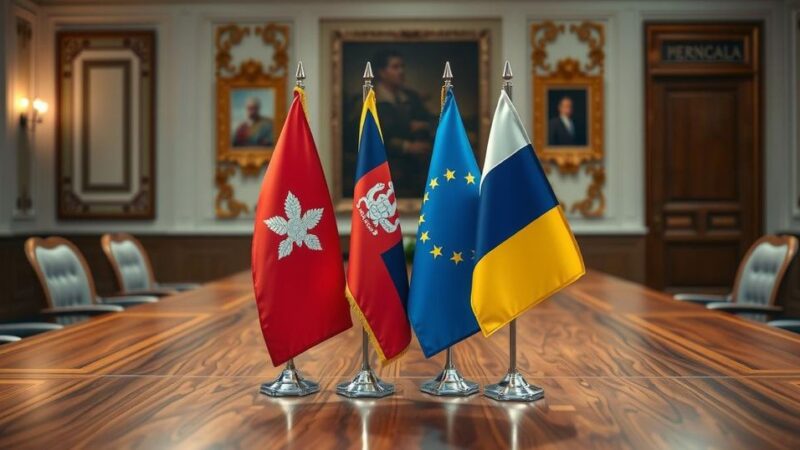Syria’s new leader, Ahmed al-Sharaa, and Lebanese Prime Minister Najib Mikati met in Damascus, marking the first visit by a Lebanese premier since the onset of the civil war in 2011. They pledged to enhance bilateral relations by focusing on mutual interests, the return of Syrian refugees, and border delineation. The meeting follows the recent election of Joseph Aoun as Lebanon’s president and indicates shifts in regional dynamics as they navigate historic tensions.
In a historic meeting on Saturday, Syria’s new leader Ahmed al-Sharaa welcomed Lebanese Prime Minister Najib Mikati in Damascus, marking the first visit by a Lebanese premier since the outbreak of the Syrian civil war in 2011. Both leaders expressed their commitment to forging a lasting relationship, emphasizing shared interests amidst past tensions over Hezbollah’s support for the Assad regime. Prime Minister Mikati underscored the necessity for mutual respect, national sovereignty, and the need to control the borders to combat smuggling, which remains a significant issue in their bilateral relations.
Sharaa expressed optimism about the future, stating, “There will be long-term strategic relations between us and Lebanon. We and Lebanon have great shared interests.” This meeting follows a significant political shift in Lebanon with the election of President Joseph Aoun, promising stability. The discussions also addressed the pressing issue of approximately two million Syrian refugees in Lebanon, with Mikati highlighting their return as a priority for both nations.
Additionally, the leaders agreed on the importance of delineating maritime and land borders, a matter of significance to Lebanon, which seeks to commence offshore gas extraction. Mikati called for the establishment of a joint committee to facilitate these discussions, reflecting a desire for concrete steps toward normalizing ties. Amid these proceedings, foreign dignitaries have taken an interest in re-establishing relations with Syria, indicating a changing regional dynamic as the country emerges from years of isolation due to the civil conflict.
The relationship between Syria and Lebanon has been historically complex, especially during the thirty years of Syrian dominance over Lebanon, instigated by the involvement of Syria in Lebanon’s civil war from 1975 to 1990. The assassination of Rafic Hariri in 2005 stirred significant Lebanese resentment against Syrian intervention, leading to the withdrawal of Syrian troops. However, with the recent election of President Joseph Aoun in Lebanon and the fall of Bashar al-Assad, there is a renewed effort to foster cooperation between both nations, focusing on mutual interests and stability regionally. The significant crisis caused by the influx of Syrian refugees into Lebanon poses urgent questions about border management and humanitarian aid, thus forming part of the current diplomatic dialogue.
The recent discussions between Syria and Lebanon signify a crucial turning point in bilateral relations that have long been marred by distrust and conflict. The commitment to establishing a shared future based on mutual interests, including resolving issues related to Syrian refugees and border management, reflects potential for improved diplomatic engagement. As both nations aim for stability and economic recovery, the outcome of their collaborative efforts will be closely monitored by the regional community.
Original Source: www.rfi.fr






